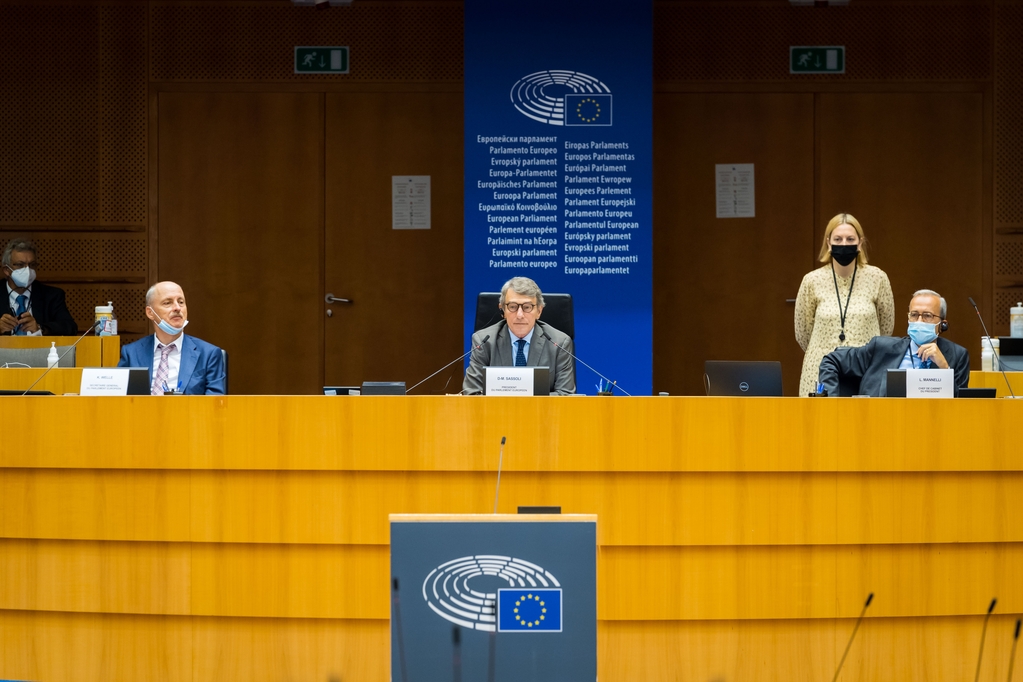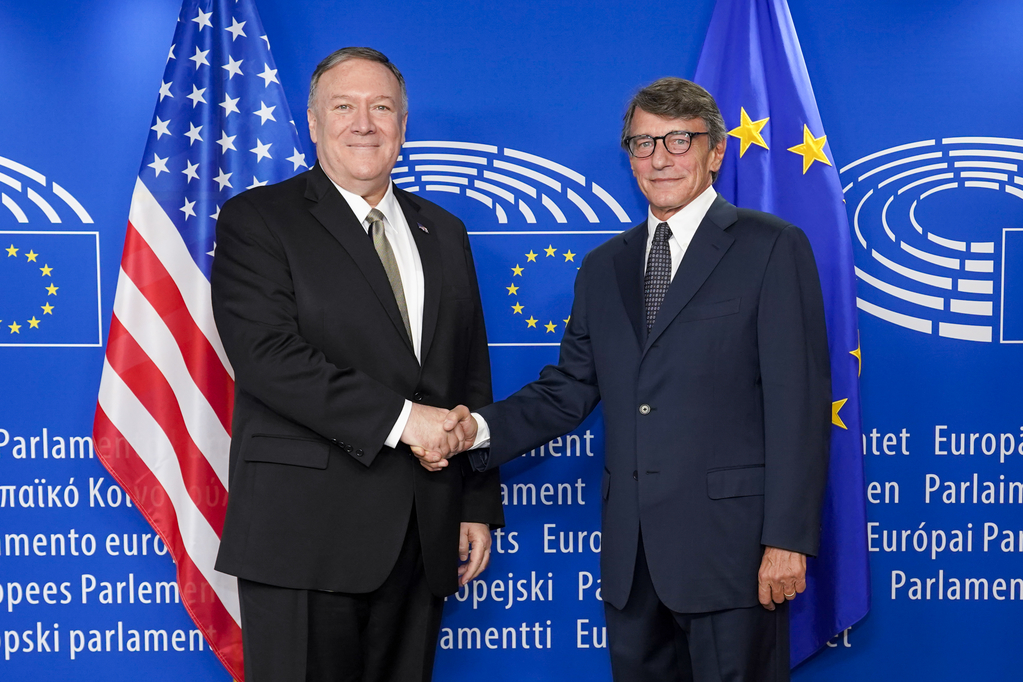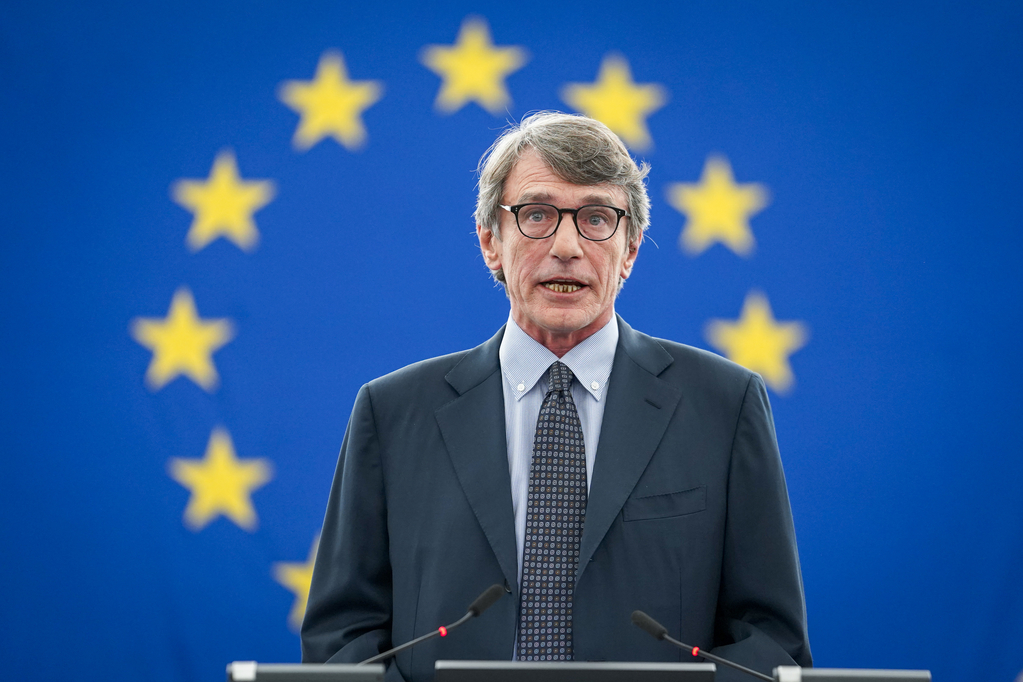Reflections of Former Presidents of the European Parliament: David Sassoli
Dear Friends
I am delighted to have the opportunity to express my views and the European Parliament's perspective on the need to strengthen democracy throughout the world and to talk about the role of the Transatlantic Alliance.
I will be very direct: the values shared by the European Union and the United States of peace, democracy and the rule of law are under threat throughout the world. Respect for human rights and for fundamental freedoms have been eroded in the past decades. Authoritarianism, xenophobia and nationalism have found many supporters who have not hesitated to use the pandemic as an excuse to undermine the foundations of our democratic systems.
The values we hold dear are not indestructible. That is why we must work, hand in hand with our ally, with all allies, and in particular with the US Congress, to defend our values. Our two institutions share the conviction that representative democracy is the best guarantee we can have for safeguarding, protecting human rights, human dignity and fundamental freedoms. Our two institutions are committed to contributing to the advancement of these values throughout the world, including through the work of subcommittees dedicated to this issue, which remains an exception in other parliamentary assemblies.
There is no doubt that acting by example is the best way to reinforce these values, and we must not retreat or slow down on this path. Recent events in the United States and in some European Member States have shown this. Trust in our institutions has been shaken due to various factors such as misinformation, hate speech, unregulated digital platforms, election interference. But this is also due to the immense challenges facing our societies, including rising inequality and climate change.
COVID-19, one of the most serious crises since the Second World War, presented us with unexpected challenges, adding new elements of complexity to an already fragile situation where large sections of the population were excluded from democratic life. As we know, the pandemic had repercussions on various sectors, not only on our health systems but also on our social model, it disproportionately affected the most vulnerable people, citizens and sections of the population from a socio-economic point of view.
 General meeting of the focus groups on the Parliament's post-covid future with David Sassoli, EP President (centre) © European Union 2021 – European Parliament
General meeting of the focus groups on the Parliament's post-covid future with David Sassoli, EP President (centre) © European Union 2021 – European Parliament
It is especially in times of crisis that our democracies must reveal their function, their usefulness as projects designed for the well-being of all, capable of protecting people, promoting equality, promoting social progress, well-being. Meeting our citizens' needs for care, work, dignity, security and prosperity for their future must be at the centre of our attention.
Democracy is not something that can be taken for granted forever but is a concept that must be nurtured and reinvented on a daily basis in order to respond to the needs of citizens in an appropriate manner. This is a theme that is very dear to the European Parliament and we have demonstrated this with the launch of the Conference on the Future of Europe, which aims to reflect on the lessons we have learned from this crisis in order to strengthen and modernise our model of European democracy. The Conference is an unprecedented democratic exercise and we are firmly convinced that the results it will produce will be concrete, tangible and useful for all the citizens who must be the heart and reference point of our institutions.
In these past months I have also launched a reflection process in the Parliament aimed at drawing lessons from the current crisis on our institution. To keep the flame of democracy burning, the pandemic has forced us to adopt new ways of working, many things have changed in the European Parliament as they have in many institutions. But now, we need to reflect more generally on the way our Parliamentary Assembly operates, to make sure that it embodies the democratic ideal and is in line with the times we are living in.
This reflection on the future and the evolution of our democratic practices has been prompted by the simple observation that the world of yesterday, the world we knew before the pandemic, is no longer appropriate to our times. That is why we need to update, to renew ourselves, to renew even the regulations, the practices with which democratic activity is carried out. Since the beginning of the pandemic we have said that we will come out from the crisis differently because we have realised that our development model is a broken model, which does not work for the entirety of our societies and we cannot allow this to happen, because we have said that no one should be left behind and therefore we must work so that this does not happen.
Multilateralism, yes multilateralism, must be our compass and we are ready to work together with you and with our neighbours to imagine and to build a new world, a world in which human rights and fundamental freedoms are respected, a better world, more just, fairer from a social and environmental point of view. From the Western Balkans to Belarus, from Africa to Latin America, when we act together we are stronger and we can defend our common values more forcefully.
A few weeks ago, during the G7, I had the opportunity to discuss with the Speaker of the US Congress, Nancy Pelosi, about the urgent need for greater cooperation between our parliaments, on issues such as climate change, migration and asylum or the fight against pandemics. Our next Democracy Summit will therefore be an incredible opportunity for our assemblies to work closely together.
 EP President David Sassoli meets with Mike Pompeo, US Secretary of State © European Union 2019 – European Parliament
EP President David Sassoli meets with Mike Pompeo, US Secretary of State © European Union 2019 – European Parliament
No country can tackle global challenges alone, but if we work together, we will naturally be better able to respond to the challenges we face and only together will we be able to overcome them. Our international order is based on rules that guide us but that are not untouchable, we have to adapt, to get in line with the changing world and the same applies to our institutions. We must not have taboos, we must not be afraid to take new action, we must not be afraid to be courageous because the challenges of today are many: from the climate emergency to the green and digital transformation, from a global health policy to a more resilient society from the socio-economic point of view, without forgetting the challenges on our borders with an increasingly aggressive Russia, a more assertive China, alongside terrorism or nuclear proliferation. All this requires commitment, a commitment to show that democracies are the systems best suited to deal with these difficulties through multilateral solutions.
To paraphrase Martin Luther King: an attack on democracies anywhere is an attack on democracy everywhere. Democracy in America is democracy in Europe, is democracy in Ukraine is democracy in Belarus. All of us together will only resist attacks from the outside and the inside if we will defend and protect each other. We must continue to walk together.
Speech at the Transatlantic Dialogue and its importance for the defense of Democracy – The role of the Parliaments. Brussels, 29 June 2021

 Plenary session - David Maria Sassoli is elected as President of the European Parliament © European Union 2019 – European Parliament
"Democracy is a continuous process. We should never take democracy for granted or as secured forever. We must take care of democracy and breathe new life into it. Above all, democracy must always go hand in hand with justice."
Plenary session - David Maria Sassoli is elected as President of the European Parliament © European Union 2019 – European Parliament
"Democracy is a continuous process. We should never take democracy for granted or as secured forever. We must take care of democracy and breathe new life into it. Above all, democracy must always go hand in hand with justice."
 EP President David Sassoli meets with Mike Pompeo, US Secretary of State © European Union 2019 – European Parliament
EP President David Sassoli meets with Mike Pompeo, US Secretary of State © European Union 2019 – European Parliament
